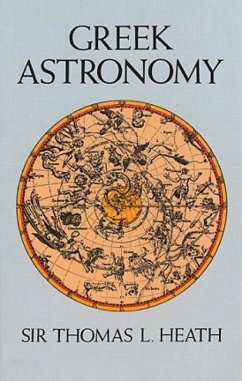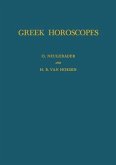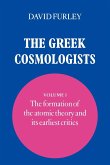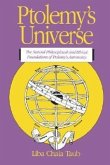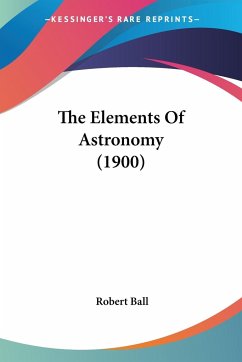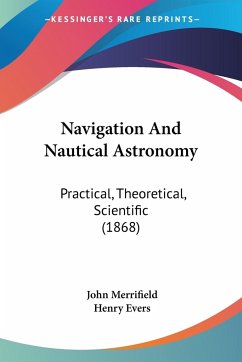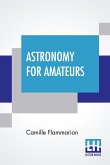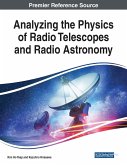Thomas L Heath
Greek Astronomy
12,99 €
inkl. MwSt.
Versandfertig in über 4 Wochen

6 °P sammeln
Thomas L Heath
Greek Astronomy
- Broschiertes Buch
- Merkliste
- Auf die Merkliste
- Bewerten Bewerten
- Teilen
- Produkt teilen
- Produkterinnerung
- Produkterinnerung
Superb scholarly study of contributions of Pythagoras, Aristarchus, Anaxagoras, Hipparchus, many other thinkers, to true scientific astronomy. Accessible to science-minded layman. Introduction.
Andere Kunden interessierten sich auch für
![Greek Horoscopes Greek Horoscopes]() H B van HoesenGreek Horoscopes44,99 €
H B van HoesenGreek Horoscopes44,99 €![The Greek Cosmologists The Greek Cosmologists]() David FurleyThe Greek Cosmologists55,99 €
David FurleyThe Greek Cosmologists55,99 €![Ptolemy's Universe: The Natural Philosophical and Ethical Foundations of Ptolemy's Astronomy Ptolemy's Universe: The Natural Philosophical and Ethical Foundations of Ptolemy's Astronomy]() Liba Chaia TaubPtolemy's Universe: The Natural Philosophical and Ethical Foundations of Ptolemy's Astronomy21,99 €
Liba Chaia TaubPtolemy's Universe: The Natural Philosophical and Ethical Foundations of Ptolemy's Astronomy21,99 €![The Elements Of Astronomy (1900) The Elements Of Astronomy (1900)]() Robert BallThe Elements Of Astronomy (1900)25,99 €
Robert BallThe Elements Of Astronomy (1900)25,99 €![Navigation And Nautical Astronomy Navigation And Nautical Astronomy]() John MerrifieldNavigation And Nautical Astronomy26,99 €
John MerrifieldNavigation And Nautical Astronomy26,99 €![Astronomy For Amateurs Astronomy For Amateurs]() Camille FlammarionAstronomy For Amateurs16,99 €
Camille FlammarionAstronomy For Amateurs16,99 €![Analyzing the Physics of Radio Telescopes and Radio Astronomy Analyzing the Physics of Radio Telescopes and Radio Astronomy]() Analyzing the Physics of Radio Telescopes and Radio Astronomy192,99 €
Analyzing the Physics of Radio Telescopes and Radio Astronomy192,99 €-
-
-
Superb scholarly study of contributions of Pythagoras, Aristarchus, Anaxagoras, Hipparchus, many other thinkers, to true scientific astronomy. Accessible to science-minded layman. Introduction.
Hinweis: Dieser Artikel kann nur an eine deutsche Lieferadresse ausgeliefert werden.
Hinweis: Dieser Artikel kann nur an eine deutsche Lieferadresse ausgeliefert werden.
Produktdetails
- Produktdetails
- Verlag: Dover Publications
- Seitenzahl: 256
- Erscheinungstermin: 2. November 2011
- Englisch
- Abmessung: 215mm x 137mm x 12mm
- Gewicht: 268g
- ISBN-13: 9780486266206
- ISBN-10: 0486266206
- Artikelnr.: 21647219
- Herstellerkennzeichnung
- Libri GmbH
- Europaallee 1
- 36244 Bad Hersfeld
- gpsr@libri.de
- Verlag: Dover Publications
- Seitenzahl: 256
- Erscheinungstermin: 2. November 2011
- Englisch
- Abmessung: 215mm x 137mm x 12mm
- Gewicht: 268g
- ISBN-13: 9780486266206
- ISBN-10: 0486266206
- Artikelnr.: 21647219
- Herstellerkennzeichnung
- Libri GmbH
- Europaallee 1
- 36244 Bad Hersfeld
- gpsr@libri.de
Thomas Little Heath: Bringing the Past to Life Thomas Little Heath (1861-1940) was unusual for an authority on many esoteric, and many less esoteric, subjects in the history of mathematics in that he was never a university professor. The son of an English farmer from Lincolnshire, Heath demonstrated his academic gifts at a young age; studied at Trinity College, Cambridge, from 1879 to 1882; came away with numerous awards; and obtained the top grade in the 1884 English Civil Service examination. From that foundation, he went to work in the English Treasury, rose through the ranks, and by 1913, was permanent secretary to the Treasury, effectively the head of its operations. He left that post in 1919 at the end of the first World War, worked several years at the National Debt office, and retired in 1926. During all of that time, however, he became independently one of the world's leading authorities on the history of mathematics, especially on the history of ancient Greek mathematics. Heath's three-volume edition of Euclid is still the standard, it is generally accepted that it is primarily through Heath's great work on Archimedes that the accomplishments of Archimedes are known as well as they are. Dover has reprinted these and other books by Heath, preserving over several decades a unique legacy in the history of mathematical scholarship. In the Author's Own Words: "The works of Archimedes are without exception, monuments of mathematical exposition; the gradual revelation of the plan of attack, the masterly ordering of the propositions, the stern elimination of everything not immediately relevant to the purpose, the finish of the whole, are so impressive in their perfection as to create a feeling akin to awe in the mind of the reader." — Thomas L. Heath
PREFATORY NOTE INTRODUCTION EPIGRAM by PTOLEMY DOXOGRAPHY: THALES
ANAXIMANDER PYTHAGORAS ALCMAEON XENOPHANES HERACLITUS PARMENIDES EMPEDOCLES
ANAXAGORAS THE PYTHAGOREANS LEUCIPPUS DEMOCRITUS PLATO: The study of
astronomy The Heavenly Choir Anaxagoras and Mind The earth The Myth of Er
The creation of the universe "Time: sun, moon, and planets" Form and
movements of fixed stars The earth and the planets The stars animate
beings: motion and names of planets EUDOXUS (AND CALLIPPUS): System of
concentric spheres Callippus' additions to the system Aristotle's
modification Simplicius on ARISTOTLE: Motion and the prime movent "The
stars and the heaven: shape, motions, distances, and speeds: supposed
"harmony" "The earth: its position, shape, rest or motion: historical
sketch" Spherical shape of the earth HERACLIDES OF PONTUS: Rotation of the
earth on its axis Motion of Mercury and Venus round the sun EUCLID: Preface
to Phaenomena ARISTARCHUS OF SAMOS: On the sizes and distances of the sun
and moon The heliocentric system: Copernicus anticipated ERATOSTHENES:
Measurement of the earth ARATUS: "Phaenomena, ll. 1-73, 91-136" Comments of
HIPPARCHUS POSIDONIUS: Measurement of the earth GEMINUS: On physics and
astronomy "The zodiac: motions therein of sun, moon, and planets" On day
and night "Months, years, and cycles" "Cycles of Meton, Callippus, and
Hipparchus" HIPPARCHUS: Hipparchus' cycle Discovery of precession of the
equinoxes PTOLEMY: The earth does not change its position in any way
whatever Arguments against the earth's rotation STRABO: On the zones
"TREATISE "DE MUNDO":" "De Mundo (from Aristotelian corpus), cc. 5-6"
CLEOMEDES: "On a "paradoxical" eclipse of the moon" PLUTARCH: On the face
in the moon?De facie in orbe lunae: extracts APPENDIX: The Constellations
of the Northern Hemisphere INDEX
ANAXIMANDER PYTHAGORAS ALCMAEON XENOPHANES HERACLITUS PARMENIDES EMPEDOCLES
ANAXAGORAS THE PYTHAGOREANS LEUCIPPUS DEMOCRITUS PLATO: The study of
astronomy The Heavenly Choir Anaxagoras and Mind The earth The Myth of Er
The creation of the universe "Time: sun, moon, and planets" Form and
movements of fixed stars The earth and the planets The stars animate
beings: motion and names of planets EUDOXUS (AND CALLIPPUS): System of
concentric spheres Callippus' additions to the system Aristotle's
modification Simplicius on ARISTOTLE: Motion and the prime movent "The
stars and the heaven: shape, motions, distances, and speeds: supposed
"harmony" "The earth: its position, shape, rest or motion: historical
sketch" Spherical shape of the earth HERACLIDES OF PONTUS: Rotation of the
earth on its axis Motion of Mercury and Venus round the sun EUCLID: Preface
to Phaenomena ARISTARCHUS OF SAMOS: On the sizes and distances of the sun
and moon The heliocentric system: Copernicus anticipated ERATOSTHENES:
Measurement of the earth ARATUS: "Phaenomena, ll. 1-73, 91-136" Comments of
HIPPARCHUS POSIDONIUS: Measurement of the earth GEMINUS: On physics and
astronomy "The zodiac: motions therein of sun, moon, and planets" On day
and night "Months, years, and cycles" "Cycles of Meton, Callippus, and
Hipparchus" HIPPARCHUS: Hipparchus' cycle Discovery of precession of the
equinoxes PTOLEMY: The earth does not change its position in any way
whatever Arguments against the earth's rotation STRABO: On the zones
"TREATISE "DE MUNDO":" "De Mundo (from Aristotelian corpus), cc. 5-6"
CLEOMEDES: "On a "paradoxical" eclipse of the moon" PLUTARCH: On the face
in the moon?De facie in orbe lunae: extracts APPENDIX: The Constellations
of the Northern Hemisphere INDEX
PREFATORY NOTE INTRODUCTION EPIGRAM by PTOLEMY DOXOGRAPHY: THALES
ANAXIMANDER PYTHAGORAS ALCMAEON XENOPHANES HERACLITUS PARMENIDES EMPEDOCLES
ANAXAGORAS THE PYTHAGOREANS LEUCIPPUS DEMOCRITUS PLATO: The study of
astronomy The Heavenly Choir Anaxagoras and Mind The earth The Myth of Er
The creation of the universe "Time: sun, moon, and planets" Form and
movements of fixed stars The earth and the planets The stars animate
beings: motion and names of planets EUDOXUS (AND CALLIPPUS): System of
concentric spheres Callippus' additions to the system Aristotle's
modification Simplicius on ARISTOTLE: Motion and the prime movent "The
stars and the heaven: shape, motions, distances, and speeds: supposed
"harmony" "The earth: its position, shape, rest or motion: historical
sketch" Spherical shape of the earth HERACLIDES OF PONTUS: Rotation of the
earth on its axis Motion of Mercury and Venus round the sun EUCLID: Preface
to Phaenomena ARISTARCHUS OF SAMOS: On the sizes and distances of the sun
and moon The heliocentric system: Copernicus anticipated ERATOSTHENES:
Measurement of the earth ARATUS: "Phaenomena, ll. 1-73, 91-136" Comments of
HIPPARCHUS POSIDONIUS: Measurement of the earth GEMINUS: On physics and
astronomy "The zodiac: motions therein of sun, moon, and planets" On day
and night "Months, years, and cycles" "Cycles of Meton, Callippus, and
Hipparchus" HIPPARCHUS: Hipparchus' cycle Discovery of precession of the
equinoxes PTOLEMY: The earth does not change its position in any way
whatever Arguments against the earth's rotation STRABO: On the zones
"TREATISE "DE MUNDO":" "De Mundo (from Aristotelian corpus), cc. 5-6"
CLEOMEDES: "On a "paradoxical" eclipse of the moon" PLUTARCH: On the face
in the moon?De facie in orbe lunae: extracts APPENDIX: The Constellations
of the Northern Hemisphere INDEX
ANAXIMANDER PYTHAGORAS ALCMAEON XENOPHANES HERACLITUS PARMENIDES EMPEDOCLES
ANAXAGORAS THE PYTHAGOREANS LEUCIPPUS DEMOCRITUS PLATO: The study of
astronomy The Heavenly Choir Anaxagoras and Mind The earth The Myth of Er
The creation of the universe "Time: sun, moon, and planets" Form and
movements of fixed stars The earth and the planets The stars animate
beings: motion and names of planets EUDOXUS (AND CALLIPPUS): System of
concentric spheres Callippus' additions to the system Aristotle's
modification Simplicius on ARISTOTLE: Motion and the prime movent "The
stars and the heaven: shape, motions, distances, and speeds: supposed
"harmony" "The earth: its position, shape, rest or motion: historical
sketch" Spherical shape of the earth HERACLIDES OF PONTUS: Rotation of the
earth on its axis Motion of Mercury and Venus round the sun EUCLID: Preface
to Phaenomena ARISTARCHUS OF SAMOS: On the sizes and distances of the sun
and moon The heliocentric system: Copernicus anticipated ERATOSTHENES:
Measurement of the earth ARATUS: "Phaenomena, ll. 1-73, 91-136" Comments of
HIPPARCHUS POSIDONIUS: Measurement of the earth GEMINUS: On physics and
astronomy "The zodiac: motions therein of sun, moon, and planets" On day
and night "Months, years, and cycles" "Cycles of Meton, Callippus, and
Hipparchus" HIPPARCHUS: Hipparchus' cycle Discovery of precession of the
equinoxes PTOLEMY: The earth does not change its position in any way
whatever Arguments against the earth's rotation STRABO: On the zones
"TREATISE "DE MUNDO":" "De Mundo (from Aristotelian corpus), cc. 5-6"
CLEOMEDES: "On a "paradoxical" eclipse of the moon" PLUTARCH: On the face
in the moon?De facie in orbe lunae: extracts APPENDIX: The Constellations
of the Northern Hemisphere INDEX
